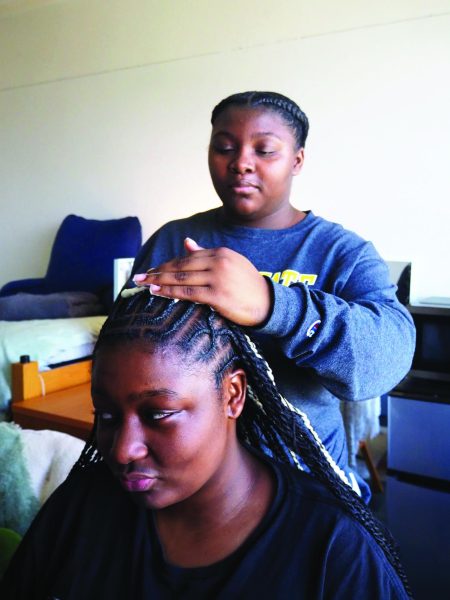Film use on campus challenged
Memo raises questions about what’s legal when showing movies on campus
March 19, 2014
Earlier this semester, the Office of Student Activities sent out an email to clubs and faculty, alerting them to the fact that showing films on campus and in dormitory lobbies can infringe upon copyright law.
The message from Student Activities director Bart Carithers has raised concern from some faculty members and club advisors.
Copyright law is complicated and confusing. It all comes down to either following the letter of the law or the spirit of it.
According to title 17 of the U.S. copyright law, movies are allowed to be shown on campus only when used instructionally for a class in a classroom or similar location.
No dormitory lobbies, no libraries and nothing that isn’t being shown for an accredited class. The instructor of the class must be able to show how viewing the copyrighted material adds to educational experience of the set class.
If the college is determined to follow the letter of the to a “t,” it seems like the only distinction of what is and is not legal comes down to location.
If students want to get together to watch movies in their residence hall, it’s okay to do so in a dorm room but not a lobby. If instructors who double as club advisors want to show films in class, it’s lawful, but outside of class–even in a classroom—it’s not. Should the same group of people decide to do the same thing in a private home, it would be legal.
Some argue that even though the wording of the law is set, people should focus on the spirit of the law.
“Words in law like copyright law are generated by humans, and these words are always open to interpretation,” Dr. Mark Leeper, constitutional law professor, said. “Even though the words seem to suggest you can’t play DVDs on campus without a license, you need to step back and look at what they’re trying to protect and why. The spirit of the law is to prevent large-scale public screenings that hurt artists financially.”
Looking at the nature of copyright law is an idea echoed by Maureen Carrigg, associate professor of electronic media.
“The fact that you can’t have three or four people sit down and watch a film, I don’t think that’s the true nature of the rule or why they put that in there,” Carrigg said.
Unfortunately, if the powers that be decide only to focus on the letter of the law, clubs are barred from showing copyright material without receiving public performance rights.
Even though the showing of foreign films in organizations like German and Spanish clubs and Sigma Delta Pi lead to learning opportunities, it does not fall under the protection granted only to class use.
“Movies have the strongest link to the culture of the countries we’re studying. I feel the clubs should be allowed to show films. I see it as part of our educational mission,” Dr. Catherine Rudin, advisor to Alpha Mu Gamma, a foreign language honorary organization, said.
If the policy stands, Rudin and perhaps others will have to change the way they do business in the classroom as well.
“I require my students to go to at least one activity a semester and that includes movies,” Rudin said.
If a classroom is okay as a film site at one point in the day, then some feel it should be permissible at any point.
“Foreign movies are a great way to learn. For all the movies we have shown, the teacher has been present,” said Dr. Adolfo Cacheiro, advisor of Sigma Delta Pi, the Spanish honor society.
If clubs wish to continue screening films, they “may request an allocation from Student Senate during the spring budget hearings. They may be eligible for a special allocation during the academic year if Senate approves their request,” according to Carithers.
There are places instructors who want to show films can turn to, including licensing companies. For instance, WSC contracts with Swank Motion Pictures to be able to show films that haven’t been released on DVD yet.
“We have a service called NETCHE, and it’s supported by Nebraska Educational Televison (NET),” Carrigg said. “Faculty can go on the NET website and, since Wayne State is a mirror site for hosting Annenburg/CPB (Corporation for Public Broadcasting), they have a list of movies they have the licenses for.”
“So groups on campus should see if there is something they’re interested in.”










Valerie Knight • Mar 20, 2014 at 9:24 am
I just wanted to let organizations know that Conn Library does have a few films in its collection in which we have already purchased public performance rights. This is indicated both on the case itself and in the library catalog. While, this right is not attached to the majority of films in our collection, a librarian can assist you in locating one of these films. In addition, our online Films on Demand Business & Economics Collection and, as mentioned in the article, our Annenburg online videos grant rights for public performances as well. Those video collections can be accessed through the library catalog or via a separate website. Faculty may also contact their library subject liaison to request the library purchase specific titles with public performance rights granted.